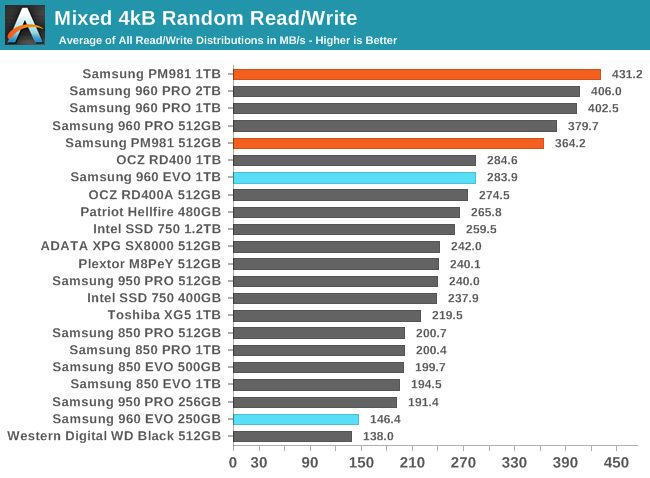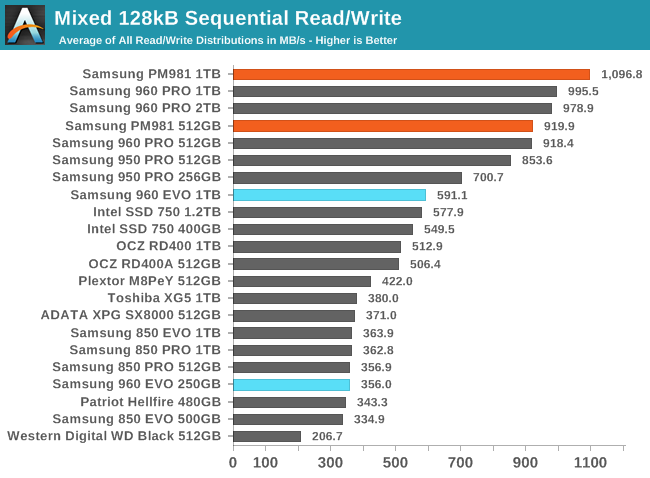The Samsung PM981 SSD Review (512GB, 1TB): Next Generation Controller And 3D NAND
by Billy Tallis on November 30, 2017 9:02 AM ESTMixed Random Performance
Our test of mixed random reads and writes covers mixes varying from pure reads to pure writes at 10% increments. Each mix is tested for up to 1 minute or 32GB of data transferred. The test is conducted with a queue depth of 4, and is limited to a 64GB span of the drive. In between each mix, the drive is given idle time of up to one minute so that the overall duty cycle is 50%.

The mixed random I/O performance of the Samsung PM981 is a big improvement over last generation's 960 EVO. The 1TB PM981 beats out even the MLC-based 960 PRO, while the smaller 512GB PM981 is a bit slower than the 960 PRO of the same size.
 |
|||||||||
As the proportion of writes in the mixed workload increases, the PM981 steadily gains performance, pulling further and further ahead of the 960 EVO. The 512GB PM981's main weakness is that its performance doesn't hit quit as high a peak during the final phases of the test when the workload is almost entirely random writes.
Mixed Sequential Performance
Our test of mixed sequential reads and writes differs from the mixed random I/O test by performing 128kB sequential accesses rather than 4kB accesses at random locations, and the sequential test is conducted at queue depth 1. The range of mixes tested is the same, and the timing and limits on data transfers are also the same as above.

The 512GB PM981 matches the mixed sequential performance of the MLC-based 512GB 960 PRO, while the 1TB PM981 is substantially faster than the 960 PRO or any other flash-based SSD.
 |
|||||||||
The Samsung 960 PRO 1TB outperforms the 1TB PM981 during the early read-heavy phases of the mixed sequential test, but then its performance drops off precipitously while the PM981 retains its performance until later in the test. The 512GB PM981 averages almost exactly the same performance as the 512GB 960 PRO, but with substantial differences in the details: the 960 PRO is faster at either end of the test, but the PM981 has a significant advantage for more even mixes of reads and writes.










53 Comments
View All Comments
msroadkill612 - Sunday, December 31, 2017 - link
Not if you have lane rich TR/Epyc IMO. 2x 512GB 960 proS in raid 0 is 2x~ faster for similar moneymsroadkill612 - Monday, January 1, 2018 - link
It bears noting that each ssd is also a controller, and the samsung one seems very superior kit which may contribute to samsung's scary advantages.Each is a 5x ARM core processor.
msroadkill612 - Monday, January 1, 2018 - link
To be the devils advocate on TLC vs MLC, isn't it odd to second guess samsung?AMD natively demonstrate that raid striping nvme (running them in parallel if u like?), results in ~seamless multiple of raw nvme ssd speeds.
Since current samsung drives individually ~max out the 4x pcie3practical bandwidth available to the m.2 port (~3500MB/s), the ceiling on nvme device speeds currently, is not set by nand, but by IO limitations.
Given multiples of speed can be achieved by raid means , the main issue is not nand chip performance (already dazzlingly fast vs recent storage options), but how to better satisfy insatiable demand using better production.
Personally, I would defer to samsung on that.